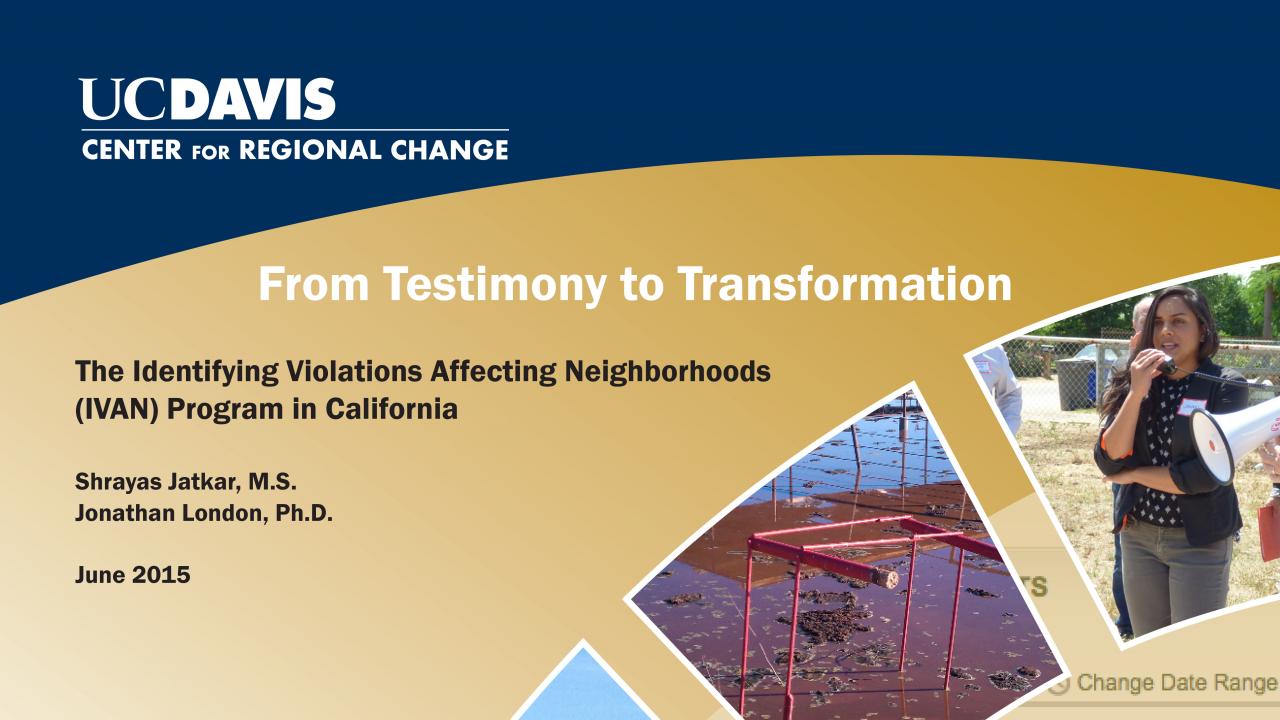
From Testimony to Transformation: The Identifying Violations Affecting Neighborhoods (IVAN) Program in California
From Testimony to Transformation: The Identifying Violations Affecting Neighborhoods (IVAN) Program in California
Authors: Shrayas Jatkar and Jonathan K. London
Identifying Violations Affecting Neighborhoods (IVAN) is an innovative program of environmental monitoring, reporting, and enforcement in California. It is intended to improve health and conditions of well-being in disadvantaged communities where residents face high levels of environmental hazards and low levels of the economic, political, and social resources needed to address them. The IVAN program resembles an environmental version of a neighborhood watch. It provides the means for community residents to report problems they experience or observe to public agencies that have the mandate and capacity to investigate and resolve them. Or, to strike an even more apt analogy, the IVAN program is like a form of community policing. This is because the program ultimately seeks to transform the process of environmental reporting and enforcement from being reactive to proactive. It does so by fostering partnerships between public agencies and the community (i.e., individuals and organizations). These partnerships are based on regular dialogue and collaborative problem solving, rather than occasional one-way flows of information between different parties. To this end, environmental justice organizations and other kinds of community-based organizations work alongside public agency staff, participating in monthly task force meetings to address environmental complaints submitted by residents. All parties are expected to work collaboratively to respond to and resolve the environmental problems reported.
The origins of this report came from a request from community and public agency partners of the UC Davis Center for Regional Change that are deeply involved with the IVAN program. These partners include the Comité Cívico Del Valle, Central California Environmental Justice Network, the San Joaquin Valley Latino Environmental Advancement Project, the Environmental Justice Coalition for Water, and the environmental justice program at the California Environmental Protection Agency (CalEPA). While the CRC conducted the research for and writing of this report, we took a collaborative approach that included the community and public agency partners throughout the process, from research design and draft review, to the completion of the report. Support for the production of this report was provided through generous grants from The California Wellness Foundation and The California Endowment.
The data for this report is drawn from written materials about the IVAN program, interviews with community leaders and staff in local and state environmental agencies, and observation of IVAN activities and bus tours between November 2014 and May 2015. The report finds evidence of multiple benefits form the IVAN environmental monitoring system in some cases. This report also identifies challenges faced by IVAN networks and makes several recommendations that could improve the effectiveness of IVAN in achieving its intended goals.
On July 13, 2015, the CRC and the CalEPA, hosted an all-day IVAN Summit to coincide with the launching of the report. The summit was co-organized by Comité Cívico Del Valle, Central California Environmental Justice Network, San Joaquin Valley Latino Environmental Advancement Project, and the Environmental Justice Coalition for Water.
Links:
